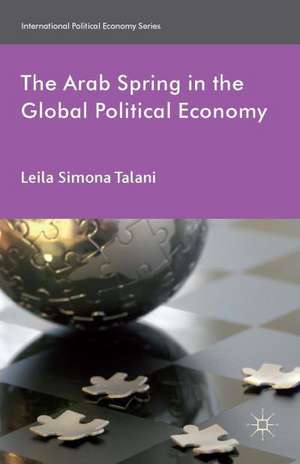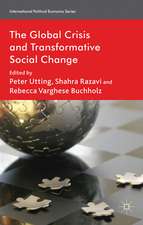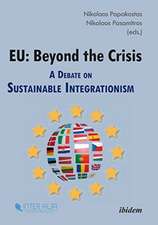The Arab Spring in the Global Political Economy: International Political Economy Series
Autor L. Talanien Limba Engleză Hardback – 20 aug 2014
| Toate formatele și edițiile | Preț | Express |
|---|---|---|
| Paperback (1) | 383.71 lei 6-8 săpt. | |
| Palgrave Macmillan UK – 2014 | 383.71 lei 6-8 săpt. | |
| Hardback (1) | 391.61 lei 6-8 săpt. | |
| Palgrave Macmillan UK – 20 aug 2014 | 391.61 lei 6-8 săpt. |
Din seria International Political Economy Series
- 9%
 Preț: 831.25 lei
Preț: 831.25 lei - 20%
 Preț: 751.84 lei
Preț: 751.84 lei - 17%
 Preț: 490.25 lei
Preț: 490.25 lei - 17%
 Preț: 363.48 lei
Preț: 363.48 lei - 20%
 Preț: 690.96 lei
Preț: 690.96 lei - 20%
 Preț: 627.55 lei
Preț: 627.55 lei - 9%
 Preț: 762.80 lei
Preț: 762.80 lei -
 Preț: 430.59 lei
Preț: 430.59 lei -
 Preț: 428.68 lei
Preț: 428.68 lei -
 Preț: 147.23 lei
Preț: 147.23 lei - 20%
 Preț: 566.64 lei
Preț: 566.64 lei -
 Preț: 385.08 lei
Preț: 385.08 lei -
 Preț: 389.11 lei
Preț: 389.11 lei - 15%
 Preț: 644.30 lei
Preț: 644.30 lei -
 Preț: 389.31 lei
Preț: 389.31 lei - 15%
 Preț: 644.30 lei
Preț: 644.30 lei -
 Preț: 413.84 lei
Preț: 413.84 lei -
 Preț: 387.38 lei
Preț: 387.38 lei - 15%
 Preț: 638.89 lei
Preț: 638.89 lei - 15%
 Preț: 644.63 lei
Preț: 644.63 lei - 18%
 Preț: 893.71 lei
Preț: 893.71 lei -
 Preț: 412.47 lei
Preț: 412.47 lei -
 Preț: 325.08 lei
Preț: 325.08 lei -
 Preț: 395.47 lei
Preț: 395.47 lei - 15%
 Preț: 641.85 lei
Preț: 641.85 lei -
 Preț: 391.40 lei
Preț: 391.40 lei -
 Preț: 388.34 lei
Preț: 388.34 lei - 15%
 Preț: 640.55 lei
Preț: 640.55 lei -
 Preț: 389.70 lei
Preț: 389.70 lei - 15%
 Preț: 646.30 lei
Preț: 646.30 lei - 15%
 Preț: 637.78 lei
Preț: 637.78 lei - 15%
 Preț: 643.84 lei
Preț: 643.84 lei -
 Preț: 386.99 lei
Preț: 386.99 lei - 15%
 Preț: 641.53 lei
Preț: 641.53 lei -
 Preț: 386.81 lei
Preț: 386.81 lei - 15%
 Preț: 639.73 lei
Preț: 639.73 lei - 18%
 Preț: 944.19 lei
Preț: 944.19 lei -
 Preț: 391.40 lei
Preț: 391.40 lei -
 Preț: 330.65 lei
Preț: 330.65 lei -
 Preț: 394.12 lei
Preț: 394.12 lei -
 Preț: 386.99 lei
Preț: 386.99 lei -
 Preț: 386.81 lei
Preț: 386.81 lei -
 Preț: 387.75 lei
Preț: 387.75 lei - 15%
 Preț: 634.68 lei
Preț: 634.68 lei -
 Preț: 392.60 lei
Preț: 392.60 lei - 15%
 Preț: 641.53 lei
Preț: 641.53 lei - 15%
 Preț: 640.06 lei
Preț: 640.06 lei - 15%
 Preț: 643.16 lei
Preț: 643.16 lei - 15%
 Preț: 642.68 lei
Preț: 642.68 lei - 15%
 Preț: 641.85 lei
Preț: 641.85 lei
Preț: 391.61 lei
Nou
Puncte Express: 587
Preț estimativ în valută:
74.94€ • 77.95$ • 61.87£
74.94€ • 77.95$ • 61.87£
Carte tipărită la comandă
Livrare economică 15-29 aprilie
Preluare comenzi: 021 569.72.76
Specificații
ISBN-13: 9781137272188
ISBN-10: 113727218X
Pagini: 251
Ilustrații: XIV, 251 p.
Dimensiuni: 140 x 216 x 23 mm
Greutate: 0.5 kg
Ediția:2014
Editura: Palgrave Macmillan UK
Colecția Palgrave Macmillan
Seria International Political Economy Series
Locul publicării:London, United Kingdom
ISBN-10: 113727218X
Pagini: 251
Ilustrații: XIV, 251 p.
Dimensiuni: 140 x 216 x 23 mm
Greutate: 0.5 kg
Ediția:2014
Editura: Palgrave Macmillan UK
Colecția Palgrave Macmillan
Seria International Political Economy Series
Locul publicării:London, United Kingdom
Cuprins
The Events of the Arab Spring The Academic Rationale: A Qualitative Definition of Globalization and its Impact on the MENA Region The Structure Of The Book PART I 1.The Chinese Butterfly and the Arab Spring 2. Bread and Globalisation 3. Bread And The Arab Spring 4. What Is Globalisation? 5. Does Globalisation Exist? 6. Skeptics 7. Globalists 8. Quantitative definition 9. Realists 10. Liberal Institutionalists (Transformationalists) 11. Qualitative definition 12. What are the Consequences of Globalisation? 13. Can Globalisation be governed? 14. Conclusion: the Three Paradoxes of Globalisation PART II 15. The Paradox of Regionalisation Within Globalisation: Some Theoretical Concerns 16. Globalisation and Regionalisation 17. Realism: the Enduring Hegemony of the State Within the 'Triad' 18. Liberal -institutionalism: Regionalism as a Step Towards Cosmopolitanism 19. Transnationalism: the Regional Dimension of the Global Restructuring of Production 20. How does Regionalisation Take Place? The Mechanisms of Integration in the IPE Theoretical Debate 21. Mainstream Theories of Regional Integration 22. Intergovernmentalist Explanations 23. Neo-functionalist Explanations 24. Critical Approaches to Regional Economic Integration 25. Neo-gramscian Approaches: A Transnational Historical Materialist Theory of Regional Integration 26. Neo-marxist Interpretations of Regionalisation 27. Neo-constructivism as a Critical Approach to Regional Integration 28. Conclusion PART III 29. The Paradox of Marginalisation: Globalisation, Marginalisation and Civil Society in the MENA Area 69 30. Introduction 31. Technological Marginalisation 32. Civil Society, Social Capital and Marginalisation 33. Islam and Civil Society ANNEX 1: Core Indicators on ICT Infrastructure and Access ANNEX 2: Core Indicators on Access to, and Use of ICT by Households and Individuals ANNEX 3: Use of ICT by Businesses ANNEX 4: The ICT Sector and Trade in ICT Goods PART IV 34. The Economic Marginalisation and Lack of Regionalisation of the MENA Area 35. Introduction 36. The Institutional Dimension of Economic (dis)integration in the MENA Region 37. The Lack of Economic Integration in the MENA Region 38. Investment and Trade Flows 39. Inter-Arab Aid Capital Flows 40. Conclusion PART V 41. Tunisia: At the Roots of the Arab Spring: Economic Restructuring Without Integration 42. Introduction: It's the Economy Stupid! 43. The Restructuring of the Tunisian Economy 44. The Integration of Tunisia in the Global Political Economy 45. Marginalisation and Extra Regional Migration: the Case of Tunisia 46. Conclusion PART VI 47. Egypt: From Liberalisation to Marginalisation 48. Introduction 49. The Mother of All Liberalisations! 50. The Marginalisation of Egypt 51. Macroeconomic Indicators of Marginalisation 52. Other Indicators of Marginalisation: Extra-regional Migration and Brain Drain 53. Conclusion PART VII 54. Libya: The Political Economy of Isolation 55. Introduction 56. The Economic Experiment of Ghadhafi 57. The Political Economy Isolation and the Role of the West 58. Assessing Libya's Economic Marginalisation 59. Conclusion 60. Regionalisation (or lack thereof) 61. Marginalisation 62. Civil Society
Notă biografică
Leila Simona Talani is full Professor of International Political Economy and Jean Monnet Chair in European Political Economy at King's College London, UK. She was previously a lecturer in European Politics at the University of Bath and a research fellow and then lecturer at the European Institute of the London School of Economics. In 2001 she spent a year as Associate Expert on migration issues at the United Nations Office for Drug Control and Crime Prevention in Cairo. Her current research interests focus on globalisation and the future of the Arab Spring as well as the political economy of migration flows from southern Mediterranean countries to the EU. She is the author of Globalization, Hegemony and the Future of the City of London (2011), Europe and the Financial Crisis (with Pompeo Della Posta, 2011), and Dirty Cities: Towards a Political Economy of the Underground in Global Cities (2013) among other titles.


















